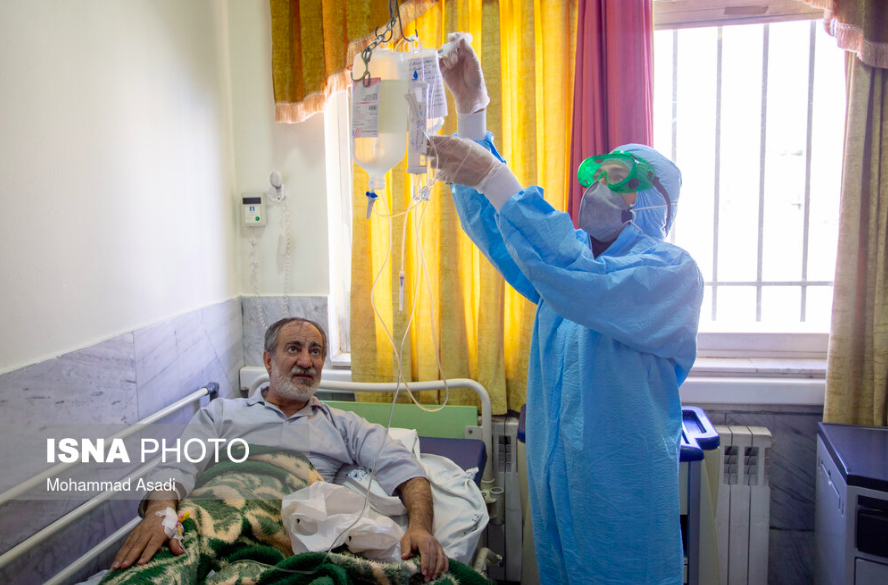Commentary: Trump’s Refusal to Relax Iran Sanctions in the Era of COVID-19 Threatens Everyone
 *This commentary was originally published on NBC News THINK.
*This commentary was originally published on NBC News THINK.
Iranian officials were dismissive of the threat, and now their belated efforts are running up against the wall of sanctions. But as usual, the most vulnerable will suffer the most.
March 26, 2020, 4:30 AM EDT
By Hadi Ghaemi, founder and executive director of the Center for Human Rights in Iran
In my 15 years as an advocate for the rights of the people of Iran, I have never been more concerned for the lives of so many people. Iran’s 85 million people are dying from the coronavirus at a rate some officials say is as often as 1 every 10 minutes. In the worst-case scenario, 3.5 million people could die, according to a study from Iran’s prestigious Sharif University.
Yet pandemics know no borders. As the rest of the world is learning, the human toll will not be confined to Iran. Continued infection there will pose a continued threat to the world, and thus the outcome of the COVID-19 epidemic in Iran will affect the world’s ability to bring the virus under control.
But Iranians are not able to effectively fight this threat alone. Squeezed between a cruel and incompetent government and a crippling sanctions regime, they lack the leadership and resources to effectively battletheir coronavirus outbreak.
As I write these words from New York, the center of the COVID-19 outbreak in the United States, Gov. Andrew Cuomo says his office has been “scouring the globe looking for medical supplies.” But Iran cannot do that.
Because of U.S. sanctions, it must jump through hoops to purchase medicine or the raw materials to produce its own supplies. Secretary of State Mike Pompeo recently stated that “humanitarian assistance to Iran is wide open; it’s not sanctioned.” Yet few countries are willing to sell even critically needed supplies to Iran for fear of violating U.S. banking sanctions.
That is why the European Union is sending aid to Iran, the U.K. has pushed for an easing of U.S. sanctions against Iran and even Iran’s neighbors, with whom it has major political differences, have been providing aid and supplies.
These governments — many of which have supported sanctions on Iran — understand that the Iranian government is failing to control the outbreak, that it is not able to get the supplies it needs on its own and that this failure threatens us all.
We can spend months deliberating over what this repressive government has brought on itself and what it deserves. But during that time, many more people will die in Iran, and the virus will continue to spread. This collective punishment of the Iranian people will only endanger our own efforts by letting the epidemic spread beyond its borders.
Time is of the essence. The U.S. government should immediately suspend all sanctions that affect the delivery of humanitarian goods to Iran, including banking sanctions on Iran, and vote yes on the $5 billion emergency funding Iran has requested from the International Monetary Fund. And the Iranian government should stop manufacturing conspiracy theories and excuses to deflect responsibility for its inhumane and incompetent response to the outbreak and accept help that is offered, whether it is from the U.S. or any other source.
Like so many times before, Iran’s government failed to uphold the basic rights of its people, in this case, the right to information and health. Instead of working to suppress the outbreak early on, Iranian officials were dismissive of the threat it posed. Now, their belated efforts are running up against the wall of sanctions. But as always, the most vulnerable will suffer the most. The poor, the working class and women will bear the heaviest burden of this crisis.
This group includes the country’s many political prisoners, who sit at great risk in Iran’s filthy and overcrowded prisons. One of them is the internationally renowned human rights lawyer Nasrin Sotoudeh, who is on a hunger strike to seek the release of all political prisoners. From the bars of Iran’s notorious Evin Prison, she sent out an open letter calling on the Iranian government to rise above its own political myopia to save its people.
“As a deadly virus sickens my country, I throw my hands down and as a citizen, in a gentle voice, I ask the government to end their animosity with the world, to look at the world through the eyes of peace and to trust life and human beings,” Sotoudeh wrote. “I specifically extend my hand to American citizens. Our governments have been rivals for years, with little regards for us.”
Let us heed her words and together marshal all our resources to fight what threatens us all.
Hadi Ghaemi is the founder and executive director of the New York-based, independent, nonprofit and nonpartisan Center for Human Rights in Iran. A former physicist, he has served on U.N.-commissioned fact-finding missions, provided expert testimony on Iran to governments around the world, and has been exposing and documenting rights violations in Iran since 2004. He can be found on Twitter @HadiGhaemi.
Copyright NBC News.





